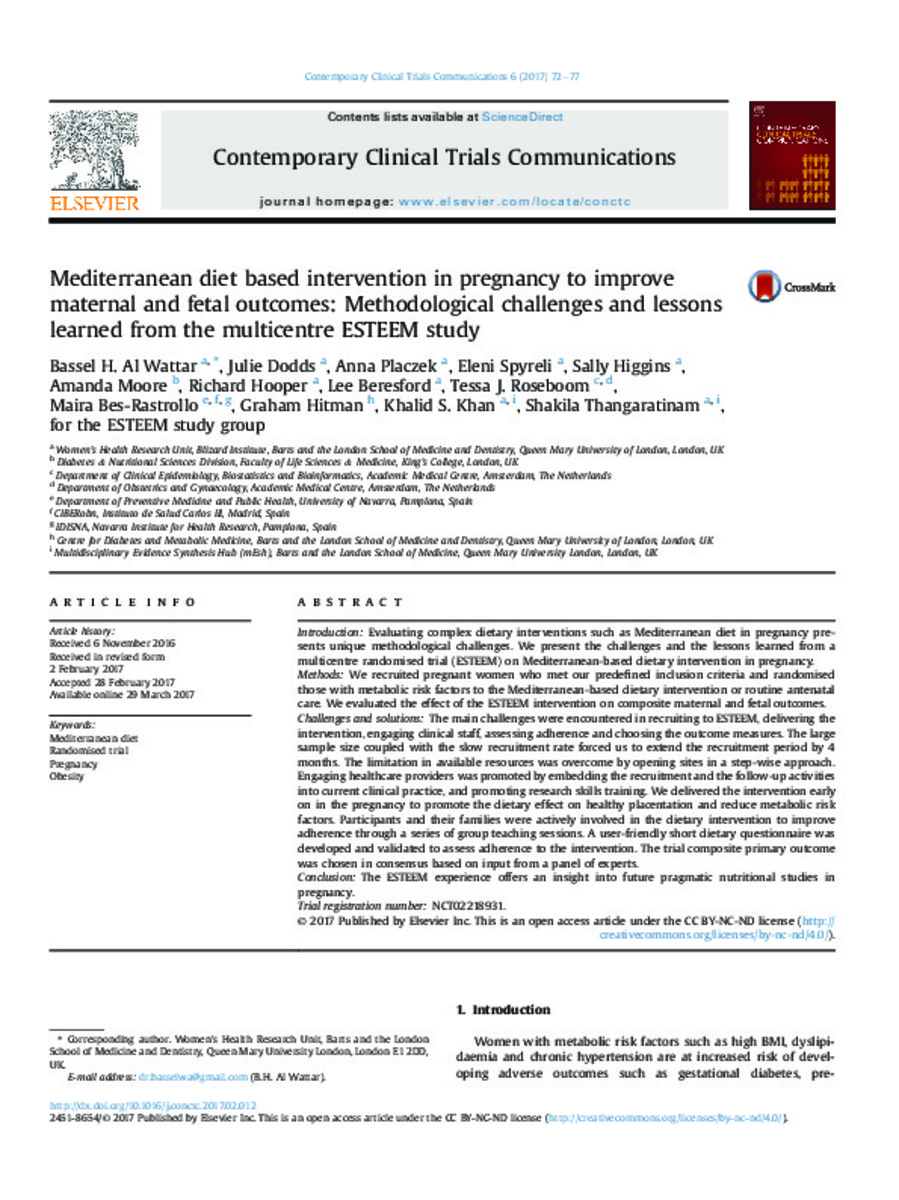Full metadata record
| DC Field | Value | Language |
|---|---|---|
| dc.creator | Al-Wattar, B.H. (Bassel H.) | - |
| dc.creator | Dodds, J. (Julie) | - |
| dc.creator | Placzek, A. (Anna) | - |
| dc.creator | Spyreli, E. (Eleni) | - |
| dc.creator | Higgins, S. (Sally) | - |
| dc.creator | Moore, A. (Amanda) | - |
| dc.creator | Hooper, R. (Richard) | - |
| dc.creator | Beresford, L. (Lee) | - |
| dc.creator | Roseboom, T.J. (Tessa J.) | - |
| dc.creator | Bes-Rastrollo, M. (Maira) | - |
| dc.creator | Hitman, G. (Graham) | - |
| dc.creator | Khan, K.S. (Khalid S.) | - |
| dc.creator | Thangaratinam, S. (Shakila) | - |
| dc.date.accessioned | 2017-04-26T12:16:41Z | - |
| dc.date.available | 2017-04-26T12:16:41Z | - |
| dc.date.issued | 2017 | - |
| dc.identifier.citation | Al Wattar B.H., Dodds J., Placzek A., Spyreli E., Higgins S., Moore A., et al. Mediterranean diet based intervention in pregnancy to improve maternal and fetal outcomes: methodological challenges and lessons learned from the multicentre ESTEEM study. Contemp Clin Trials Commun 2017 Mar;6:72-77. | es_ES |
| dc.identifier.issn | 2451-8654 | - |
| dc.identifier.uri | https://hdl.handle.net/10171/43263 | - |
| dc.description.abstract | Introduction: Evaluating complex dietary interventions such as Mediterranean diet in pregnancy presents unique methodological challenges. We present the challenges and the lessons learned from a multicentre randomised trial (ESTEEM) on Mediterranean-based dietary intervention in pregnancy. Methods: We recruited pregnant women who met our predefined inclusion criteria and randomised those with metabolic risk factors to the Mediterranean-based dietary intervention or routine antenatal care. We evaluated the effect of the ESTEEM intervention on composite maternal and fetal outcomes. Challenges and solutions: The main challenges were encountered in recruiting to ESTEEM, delivering the intervention, engaging clinical staff, assessing adherence and choosing the outcome measures. The large sample size coupled with the slow recruitment rate forced us to extend the recruitment period by 4 months. The limitation in available resources was overcome by opening sites in a step-wise approach. Engaging healthcare providers was promoted by embedding the recruitment and the follow-up activities into current clinical practice, and promoting research skills training. We delivered the intervention early on in the pregnancy to promote the dietary effect on healthy placentation and reduce metabolic risk factors. Participants and their families were actively involved in the dietary intervention to improve adherence through a series of group teaching sessions. A user-friendly short dietary questionnaire was developed and validated to assess adherence to the intervention. The trial composite primary outcome was chosen in consensus based on input from a panel of experts. Conclusion: The ESTEEM experience offers an insight into future pragmatic nutritional studies in pregnancy. | es_ES |
| dc.language.iso | eng | es_ES |
| dc.publisher | Elsevier | es_ES |
| dc.rights | info:eu-repo/semantics/openAccess | es_ES |
| dc.subject | Materias Investigacion::Ciencias de la Salud::Salud pública | es_ES |
| dc.subject | Mediterranean diet | es_ES |
| dc.subject | Randomised trial | es_ES |
| dc.subject | Pregnancy | es_ES |
| dc.subject | Obesity | es_ES |
| dc.title | Mediterranean diet based intervention in pregnancy to improve maternal and fetal outcomes: Methodological challenges and lessons learned from the multicentre ESTEEM study | es_ES |
| dc.type | info:eu-repo/semantics/article | es_ES |
| dc.description.note | This is an open access article under the CC BY-NC-ND license (http://creativecommons.org/licenses/by-nc-nd/4.0/). | es_ES |
| dc.identifier.doi | http://dx.doi.org/10.1016/j.conctc.2017.02.012 | es_ES |
| dadun.citation.publicationName | Contemporary Clinical Trials Communications | es_ES |
Files in This Item:
Statistics and impact
Items in Dadun are protected by copyright, with all rights reserved, unless otherwise indicated.






